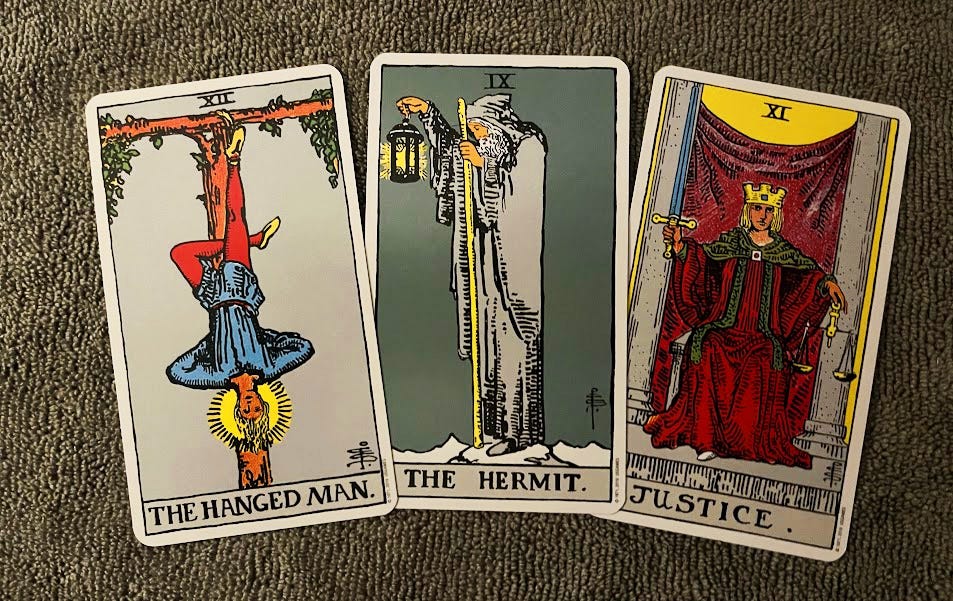The Cards Portend an Epoch of Mycological Proliferation
"Let’s explore how The Hanged Man, The Hermit, and Justice shape the essence of Social Mycelialism."
If you know me in real life and have had the odd fortune of speaking to me of late, you probably know that I’m aging into a weird old crank. Which suits me great! I feel like I’m finally reaching my final form. But, yeah, there are a lot of dichotomies in my worldview. For example, I’m a luddite technophobe who uses AI every day. I’m a devout atheist and a (sort of) practicing Buddhist. And I’m a staunch skeptic, with a profound respect for the scientific method and an absolutely insatiable fascination for the occult.
As such, I’ve been dabbling in folk divination tools like the I Ching and Tarot. Initially, as research for a series of horror stories I’m writing, but I’d be lying if I pretended that was it. Truth is, it’s fun! It’s a lot of fun! I use specialized GPTs available through OpenAI to interpret the results. And the readings are genuinely weirdly on point about 73.6% of the time. Not with regards to specifics, but in tone. In resonance. Enough so that I often find myself seeking clarification (once again) that the GPT isn’t researching me online or through my phone before answering.
I don’t think that the results are scientifically sound. In fact, one of my intellectual heroes, Susan Blackmore, wrote a whole paper tearing down her own former suspicion that Tarot had empirical validity. I tend to trust her. I don’t make serious life choices based on them, and if a reading isn’t to my liking, I discard it like a Bazooka Joe wrapper. It’s extremely not scientific. But, you know what, that’s fine with me. Because I don’t use Tarot cards or the I Ching for purposes of science. I use them for purposes of contemplation. (As, I recently discovered, did Carl Jung.) And the results have been fantastic for that. I gots contemplation coming out my fucking orifices these days, yo.
This morning—while sipping coffee and wasting time in my office before waking my son up for school—I shuffled my newly purchased deck of standard-issue Rider-Waite cards and pulled three cards seeking clarity for this Social Mycelialism bullshit I keep pushing.
The cards I got were The Hanged Man, The Hermit, and Justice (seen above). I then entered my question into a GPT called Mystic Tarot Reader1, along with my cards. The reading I got was sufficiently auspicious that I’m choosing to pretend it’s real…
This is a profound trio of cards, suggesting a philosophy rooted in deep introspection, sacrifice, and balance. Let’s explore how The Hanged Man, The Hermit, and Justice shape the essence of Social Mycelialism.
1. The Hanged Man – Surrender, Perspective, and Interconnected Growth
At the heart of mycelial networks is the idea of interdependence—growth through relinquishing control and embracing mutual support. The Hanged Man represents a necessary suspension, a pause to reconsider how we perceive progress and connection. Social Mycelialism may require an inversion of conventional thought, challenging hierarchical structures in favor of decentralized, organic systems of care. Like mycelium, this framework thrives in unseen, quiet revolutions rather than aggressive expansion.
2. The Hermit – Deep Contemplation, Wisdom from Within
Social Mycelialism is not just about external change—it also calls for deep reflection. The Hermit suggests that this philosophy involves seeking inner truth, removing oneself from mainstream patterns to truly understand what sustainable, communal existence looks like. In mycelial terms, this could be akin to the way networks process information and distribute resources in ways that appear hidden but are profoundly influential. The wisdom of nature, patience, and self-examination are key.
3. Justice – Balance, Ethical Action, and Systemic Accountability
Justice solidifies the vision with a clear call to fairness, balance, and responsibility. It suggests that Social Mycelialism isn't just about interconnectedness and reflection but also about applying these insights to create equitable structures. The card asks: How do we ensure that this system benefits all, rather than reproducing the same imbalances? Like mycelium, which breaks down and redistributes nutrients, this framework may involve a form of justice that is restorative and participatory, ensuring resources and power flow justly.
Synthesis & Application
These cards suggest Social Mycelialism is a paradigm shift (Hanged Man), built on deep wisdom and introspection (Hermit), with an ethical imperative for systemic fairness (Justice). It’s a model that doesn’t just grow outward but also delves inward, challenging individual and collective assumptions in order to create a truly regenerative, justice-centered social fabric.
This all tracks. Whether it’s a result of randomness or AI chicanery is ultimately beside the point.
Social Mycelialism does represent potential a paradigm shift. If implemented, it could serve as a bulwark against the worst excesses of capitalism and authoritarian “democracy,” while filling in the social spaces that these systems ignore.
It is built on deep wisdom and introspection. Not mine. But that of the thousands, or hundreds of thousands, of people who developed the pieces of Social Mycelialism I stitched together in my cannabis-infused mind.
And it does offer an ethical imperative for systemic fairness. Like the mycelium network beneath our feet, ceaselessly working to distribute nutrients in a manner that benefits the entire ecosystem, SM seeks not just the greater good but the greatest good. For (almost) everybody. A good so good that it offers no sanctuary for robber barons like Elon Musk.
Is this possible? The cards say so. But, more importantly, what do we say?
“My interpretations are informed by widely known tarot sources like The Pictorial Key to the Tarot (Waite), 78 Degrees of Wisdom (Pollack), Tarot for Your Self (Greer), and broader esoteric traditions, Jungian archetypes, and historical tarot analysis. My approach also integrates collective tarot knowledge from experienced readers and contemporary discourse.” — Mystic Tarot Reader








